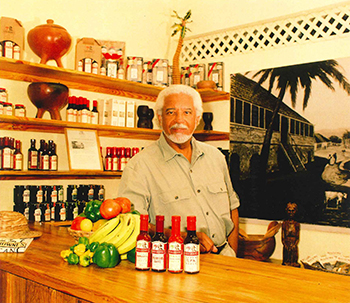Winston Stona
Winston Stona introduced Jamaican jerk seasonings to the U.S. through Busha Browne, the Kingston-based company he co-founded in the late 1970s. Its high-end, all-natural sauces and condiments are made from fresh fruits and vegetables grown by small farmers on the island, prepared and bottled in small batches.
Inspiration… The Irish peer, Howe Peter Browne, 2nd Marquess of Sligo, was the governor of Jamaica from 1834-1836 and freed the enslaved people on his estates. Other planters, fearing loss of profits, sold their plantations to local managers, known as bushas. During his time in Jamaica, Browne kept a diary of meals he’d been served and the flora and fauna he found. A descendant, Charlie Browne, retrieved the diary from the family archive.
“Ninety percent of our production is recipes from the Sligo diary,” Stona, 75, says. “We don’t just make marmalade, we make Burned Orange Marmalade. We make Original Twice-Boiled Guava Jelly, only manufactured in season.”
Stona, a Jamaican citizen, went to the London School of Economics and came back in the 1960s to be Jamaica’s assistant director of tourism. He got involved in building and promoting the Jamaican fashion industry in the U.S. and England, working from 6 a.m. to midnight, traveling constantly. He also acted in movies, such as “The Harder They Come,” though he says he never took acting seriously.
“I was dead tired,” he recalls of that time. In search of peace, he moved back to his family property where they grew sugar cane, bananas, and coconuts. In the 1970s, he was persuaded by a European Union official to study value-added products on the island. He realized they had world-class ginger, allspice, pineapple, and Scotch bonnet pepper, but were not developing any of it into finished products. He was inspired to go into agri-business and formed Busha Browne.
Impact… Stona built the Busha Browne brand slowly. Sugar cane was dominant then, much of it going to the rum industry. It wasn’t easy to find raw materials to fuel production. Most farms were no more than five acres, so Stona collected 300 small farmers to grow what he needed. Today, in addition to supporting farmers, Busha Browne employs 80 to 100 people, depending on the season.
The marmalades, jellies, chutneys, and seasonings were first sold in local markets. Tourists tasted them and took them back home to share with friends. In the early 1980s, Stona began exporting Busha Browne products abroad; by that time there were enough people familiar with the labels to pluck the brand off store shelves.
His background in fashion served him well when it came to designing Busha Browne’s attractive, artful packaging. “Food and fashion are wonderful industries,” he says, “constantly evolving, bringing out something new, thinking of ways to romance your line.”
The Future… Stona sold Busha Browne a few years ago to Associated Manufacturers Limited, where the brand continues to grow and diversify beyond sauces and seasonings. He is still a consultant for Busha Browne as well as for Walkerswood, a lower-priced, Caribbean line.

